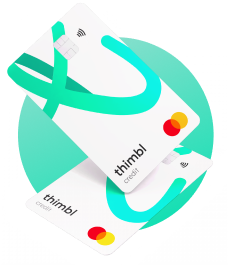Debit vs prepaid cards for under-18s
Top Cards for Under-18s
From debit cards to prepaid cards, thimbl lifts the lid on the best cards for under-18s.




Looking for information on cards for under-18s?
From debit cards that offer financial independence to prepaid cards that could help children learn the importance of budgeting and money management, the thimbl guide to cards for under-18s explores different options.
Can you get a credit card if you’re under-18?
To sign a credit agreement in the UK, you must be at least 18 years of age. This means that it’s not possible to apply for a credit card if you’re under the age of 18.
However, there are other options that could be available to under-18s, including prepaid and debit cards.
Cards for under-18s
In the table below, we’ve detailed the two card options available to under-18s, outlining their key features and the things to think about before you decide.
| Debit card | Prepaid card |
|---|---|
| Who's it for? You’ll typically need to be over the age of 11 to get a debit card, although the minimum age could be higher or lower, depending on the provider. |
Who's it for? Some prepaid cards could be available to children as young as 6, although a parent/guardian will typically need to apply on the child’s behalf. |
Key features:
|
Key features:
|
Things to be aware of:
|
Things to be aware of:
|
Why you might consider a card for under-18s
Key financial skills, such as budgeting and money management, may not be covered in some schools, yet they’re an important part of life. Giving your child their own card and access to their own money could help to build their financial understanding and confidence. It’s never too early to introduce children to the concept of money.
Which bank is best for under-18s?
It’s important to note that there’s no ‘best’ bank for under-18s; different banks will suit different people. When searching for a bank for under-18s, you should take the time to read through the features offered by each to help you understand which one could be the most suitable match for your child. Some banks may offer cards for under-18s with no fees, while others may be running a certain promotional offer that could appeal to your child - for example, NatWest recently offered a three-month Xbox Game Pass Ultimate for children/teens approved for their Rooster Card subscription.
A comparison site could help you compare bank accounts for children.
Should I get my child/teenager a prepaid or debit card?
It’s up to you whether you apply for a prepaid or debit card for your child/teenager. When considering the options, there are several things you may wish to consider, including the age of your child and how much control you’d like to have over their spending.
It’s worth noting that a prepaid card should not be confused with a gift card.
The three main differences between a prepaid and a debit card for under-18s:
- Bank account vs no bank account
A debit card comes with a bank account; a prepaid card does not. - Level of parental input
With a prepaid card, the child’s parent or guardian will usually have full access to and control over the child’s spending, while a debit card will be linked to a bank account in the child’s name that only they can access.
Younger children could benefit from monitoring while they get to grips with money management, while teens may appreciate a little more financial independence. - Availability based on age
Prepaid cards are typically available to anyone from the age of 6, while the general age requirement for a debit card is slightly higher, at 11 years old.
Can under-18s get a thimbl Credit Builder Credit Card?
No, they can’t. One of the eligibility requirements for a thimbl credit card is that applicants must be over the age of 18.
Four interesting financial facts about under-18s
- 47% of children between the ages of 7 and 17 report that they have not received financial education at home or at school.
- A study released in 2025 revealed that 55% of 7- to 14-year-olds surveyed said that money affects their overall happiness.
- The same study also found that 46% of respondents admitted to feeling worried about money and their future.
- While there are plenty of online resources and apps to help with financial health for under-18s, it might surprise you to learn that 87% of children said that they would prefer to learn about money in a practical way, rather than relying on sources online. Just 34% expressed that they’d turn to social media or influencers for financial education.
What does this mean?
Simply put, this means that we must do more to encourage financial confidence in under-18s. As discussed, it’s never too early to teach children about the importance of money. Financial education doesn’t have to be a tedious task; there are many things you can do to promote financial health and awareness in a fun way. ‘Playing shop’ is a classic way to get younger children involved with money management. For older children and teens, allowing them their own prepaid or debit card could make a world of difference to their understanding of practical money management.
What to do if you’re worried about money
Money worries are sadly very common – but you don’t have to face them alone. Please know that you can access free, confidential advice on a range of money and debt-related topics through charities and organisations such as StepChange, MoneyHelper, Citizens Advice, and National Debtline.
If you’re reading this article as someone who’s under the age of 18 and you’re concerned about money, it’s important to remember that help is available. Whether you’re worried about your own or your family’s financial situation, you can confidentially discuss your concerns with charities including Young Minds, Childline, and the Samaritans.
You’re not alone.

Page last reviewed: 18th November 2025
Page reviewed by: Harry Lawrance
You get all this with thimbl
Tap and go
Quick and easy contactless payments up to £100.
Secure banking app
Manage your credit card online, wherever and whenever you like, with the free mobile app.
A trusted service
Over 4,500 positive reviews from our customers.
48.9% APR Representative (variable)
Quick links







Worried about money?
If you're worried about the cost of living, need support with budgeting, or think you might need debt advice, StepChange could help. They offer free and impartial support and help hundreds of thousands of people every year to deal with their debts and take control of their finances.
To find out how StepChange could help you, take the free Money Health Check. It's quick and easy to complete, and will give you a personalised recommendation on what to do next.
Meet the team
Head of Compliance
Head of Partnerships
Managing Director, thimbl
Marketing Manager, thimbl
Financial Content Writer
Frequently asked
questions
If you've got a question, you may just find the answer you're looking for here. If not, please visit our contact us page and get in touch.
What will my credit limit be?
You will always be made aware of any credit limit changes to any credit cards you have beforehand, and you do not have to accept a credit limit increase if you don't feel it's right for you.
What happens if I fail to make my repayments?
Missed payments will be reported to the credit bureaus, and your account will appear as in arrears. You will be charged a late fee, which is usually around £12. Your credit rating is also likely to decline as a result.
You should try to make your missed payments as soon as possible.
If you're struggling to keep on top of your repayments, you can find free, impartial advice from MoneyHelper, StepChange, Citizens Advice and National Debtline
If you want to know more about how credit cards work, you can read our blog.
Did you find this article helpful?
Let us know how we can be more helpful
Please leave your anonymous feedback to help us keep improving.
Need help or support?
Whether it's a question or you just need support, we're here to help.







